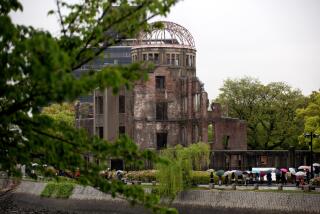He Cites WWII Alliance, Urges Better Ties : Soviets Surprise American Envoy, Publish His Letter
- Share via
MOSCOW — The Soviet government newspaper Izvestia departed from custom Saturday to print a letter from U.S. Ambassador Arthur A. Hartman calling for improved East-West relations to mark the 40th anniversary of the end of World War II in Europe.
Hartman recalled the historic link-up of American and Soviet forces on the Elbe River in Germany in the spring of 1945.
“I well remember the event, and the joy and hope it inspired. Two great--if profoundly different--peoples had at long last linked up in a common cause . . . . Nothing on Earth seemed impossible.”
Hartman wrote that the bright hopes were tarnished by postwar realities, saying: “The glow of our wartime cooperation has dimmed. We regret this.”
His letter included statements rarely published in the Soviet media, such as a quote from President Reagan saying that a nuclear war “cannot be won and must never be fought.” And he said that is the basis of the U.S. approach to the renewed arms control negotiations in Geneva.
Earlier in the week, Soviet leader Mikhail S. Gorbachev had said that the first round of the new Geneva arms talks showed that the United States does not want an agreement to limit nuclear weapons.
Hartman’s letter noted that Reagan will meet this week in Bonn with leaders of former wartime Allies but also with leaders of three wartime enemies--West Germany, Japan and Italy.
“We will commemorate the end of the war,” the American ambassador wrote. “But, more important, we will celebrate its aftermath: 40 years of peace (in which) a shattered world rebuilt strong democracies created on the ashes of Nazism and Facism, and the emergence of a new generation for whom the war is but a distant memory.”
In articles concerning the 40th anniversary celebrations here, the Soviet media have charged that neo-Nazism in West Germany is being encouraged by the Reagan Administration.
Hartman praised the Soviet Union’s wartime role. “Indeed, the American people can never forget the heroic contributions of the Soviet people and its armed forces to the winning of the war in Europe,” he said, recalling that he served as a young airman in the Far East during World War II.
“Our own country was fortunate in that the war was not fought on our soil,” he said. “But that did not make our individual losses less tragic, nor did it make us less sensitive to the horrors of war.”
Hartman said that the American and Soviet soldiers who embraced at the Elbe River link-up were aware that peace was near.
“Knowing the horrors of war, they were determined to preserve that peace,” he said. “In an age of weapons of mass destruction, our determination can be no less than theirs.
“Mikhail Sergeevich Gorbachev said in March that improving East-West relations would be an appropriate means of marking the anniversary of the end of World War II,” the envoy recalled. “We could not agree more.”
The letter was published on Page 4 of Izvestia, the official government newspaper, and the text was carried by Tass, the government news agency.
The letter was submitted to the Soviet Foreign Ministry by Hartman in early April with a request that it be published on the anniversary of the meeting of Soviet and American troops at Torgau, East Germany, on the Elbe River. When the message did not appear on the anniversary last Thursday, the U.S. Embassy made its text public as a press statement.
The appearance of the letter Saturday came as a “pleasant surprise,” an embassy aide said. Last July 4, Hartman was denied the usual opportunity provided to ambassadors to make a short statement on the evening television news show on the United States’ independence day.
There have been occasional precedents for printing letters from Western leaders, although this does not happen often here.
More to Read
Sign up for Essential California
The most important California stories and recommendations in your inbox every morning.
You may occasionally receive promotional content from the Los Angeles Times.











